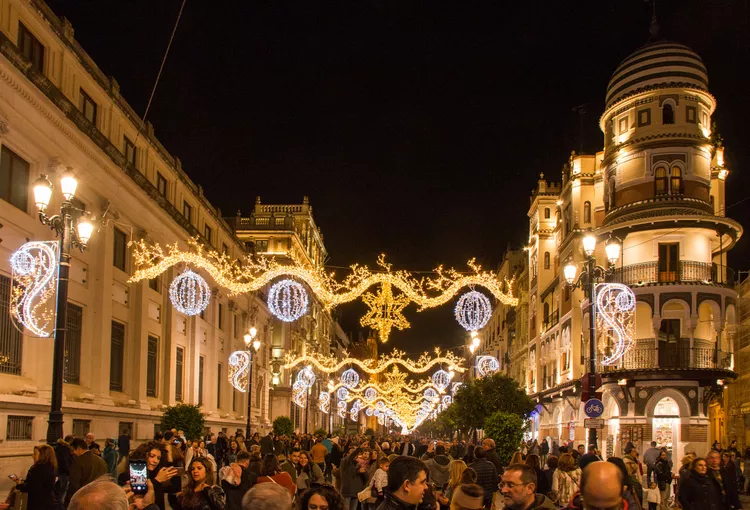Christmas Celebrations in Spain
For the Spanish, Christmas Eve is significantly more celebrated than Christmas Day. A grand meal with family takes place on December 24th, accompanied by a visit to church for the Christmas Mass. While there are additional unique customs, a festive dinner and Spanish sweets for dessert are the most iconic aspects of Christmas in Spain.
If you are fortunate enough to be invited to join a local family on Christmas Eve or Christmas Day, be aware that, unlike in America where gifts are traditionally exchanged on December 24th or 25th, in Spain, this occurs 13 days later on January 6th for Dia de las Reyes. On this day, there is even more feasting, and the specialty is the roscón de los reyes, a ring cake made to resemble a king’s crown adorned with candied fruits.
Christmas Eve Food
Experiencing Christmas in Spain reveals that Christmas Eve represents one of the most significant and celebrated meals of the year. Traditionally, the pavo trufado, or turkey stuffed with truffles, was a dish favored by the elite. However, the prevailing custom now is to enjoy lavishly, with meals that often include lobster, a roast, typically lamb or suckling pig, and various side dishes.
Additionally, most families will serve soup, frequently fish stew, alongside an array of seafood, cheeses, hams, and pâtés. Dinner begins late, around 10 p.m., and can extend for several hours.
- Popular foods include mandarins (mandarinas), walnuts (nueces), and dates (datiles).
Christmas Sweets
Spanish Christmas treats are a delectable highlight, featuring an assortment of nougats, marzipans, and crumbly cakes. The most renowned sweet of the season is turrón, a nougat typically crafted with nuts. There are two main types: the soft nougat known as turrón blando and the hard nougat called turrón duro.
A popular confection that Spain has embraced is marzipan, known as mazapán in Spanish. The yema, a kind of marzipan made with egg, is a specialty of the town of Ávila.
Also cherished during the holiday season are two types of crumbly cakes: polvorones and mantecados. These Spanish shortbreads, made from flour, sugar, milk, and often almonds, have different textural qualities. Polvorones are typically dusted with powdered sugar, while manteca, meaning “lard,” is a key ingredient in the latter.
Eating at a Restaurant
It is nearly impossible to find a meal in a restaurant on Christmas Eve since most local establishments are closed. However, some major hotels may remain open. On Christmas Day, dining options begin to reopen, but it is advisable to plan ahead. If you arrive in Spain a few days prior to Christmas, consider securing a restaurant reservation for Christmas Day as a priority.





